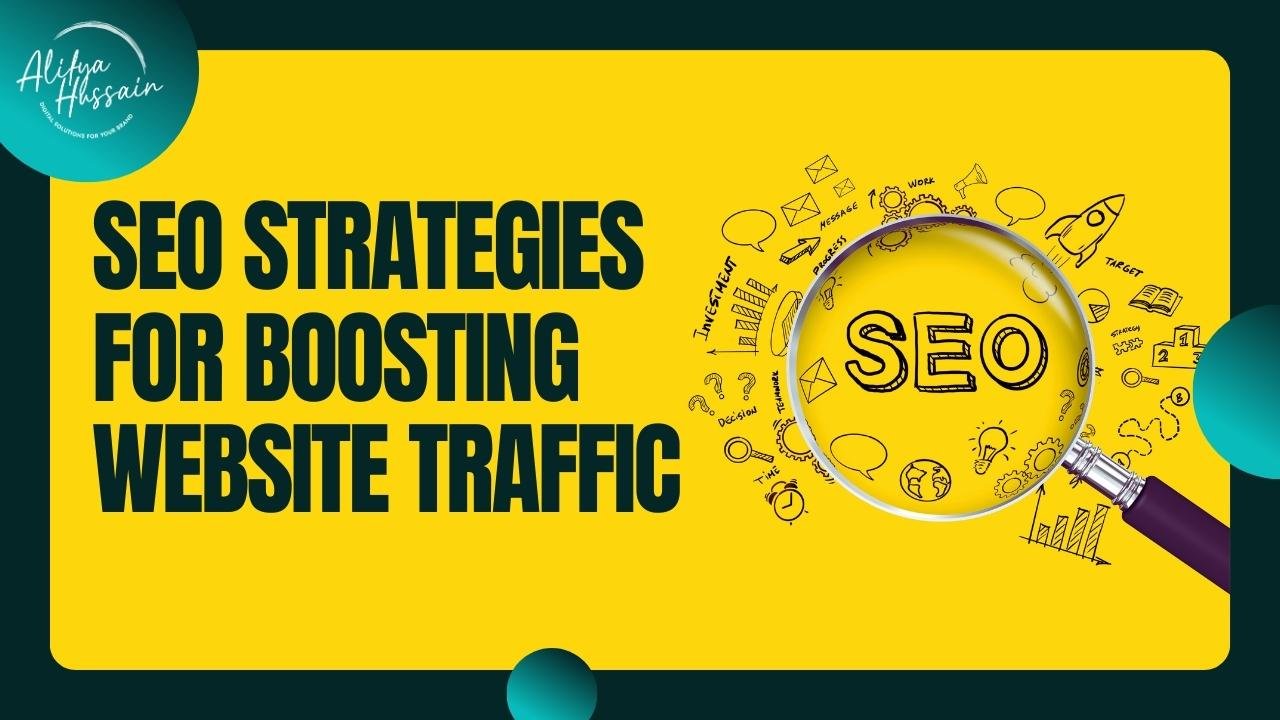Introduction to SEO Strategies
In today’s competitive digital landscape, attracting consistent and targeted traffic to your website is vital for success.One of the most effective ways to drive traffic to your website is through search engine optimization (SEO). By implementing strategic SEO strategies, you can improve your website’s visibility on search engine result pages (SERPs) and attract more organic traffic. In this article, we will explore various SEO strategies that can help you boost website traffic and unlock the potential of your online presence. Discover effective SEO strategies that will optimize your website, improve search engine rankings, and drive organic traffic.

Table of Contents:
- Introduction
- Understanding the Importance of SEO Strategies
- Conducting Keyword Research for Targeted Traffic
- On-Page Optimization for Enhanced Visibility
- Creating High-Quality and Engaging Content
- Optimizing Website Structure and Navigation
- Building Quality Backlinks for Authority
- Leveraging Social Media for Increased Visibility
- Monitoring, Analyzing, and Fine-Tuning
- Conclusion
- FAQ’s
Understanding the Importance of SEO Strategies
SEO (Search Engine Optimization) strategies are essential for increasing website visibility and attracting relevant traffic. By optimizing your website according to search engine guidelines, you can improve your chances of appearing in search results, reaching your target audience, and driving organic growth.
Conducting Keyword Research for Targeted Traffic in SEO Strategies
Keyword research forms the foundation of any successful SEO strategy. Identify relevant keywords and phrases that your target audience is likely to use when searching for products or services similar to yours. Incorporate these keywords strategically throughout your website content to attract organic traffic.
On-Page Optimization for Enhanced Visibility
On-page optimization involves optimizing various elements on your website to improve visibility and search engine rankings. This includes optimizing meta tags, headers, URLs, and image alt tags. Ensuring your website is easily crawlable by search engine bots and providing a seamless user experience are also crucial aspects of on-page optimization.
Understanding the Importance of Keywords
Keywords play a vital role in SEO as they are the terms and phrases that users enter into search engines when looking for information. Incorporating relevant keywords throughout your website’s content can significantly impact its visibility. Begin by conducting keyword research to identify the most relevant and high-performing keywords in your niche. Tools like Google Keyword Planner and SEMrush can assist you in this process.
On-Page Optimization Techniques in SEO Strategies
On-page optimization refers to optimizing individual web pages to improve their ranking and visibility. It involves optimizing various elements on your website, such as meta tags, headings, URLs, and content. Here are some on-page optimization techniques to consider:
1. Meta Tags Optimization
Meta tags, including meta titles and meta descriptions, provide brief summaries of a web page’s content to search engines and users. Ensure that your meta tags accurately reflect the content of each page and include your target keywords. Aim for concise and compelling meta descriptions that entice users to click on your website.
2. Header Tags
Header tags, such as H1, H2, H3, etc., help search engines understand the structure and hierarchy of your content. Use your primary keyword in the H1 tag, and incorporate secondary keywords in the subsequent header tags. This approach enhances both user experience and SEO.
3. Optimized URLs
Craft SEO-friendly URLs that are descriptive and contain relevant keywords. Avoid long and complex URLs, as they can be challenging for both users and search engines to comprehend. A clean and concise URL structure improves the overall user experience and boosts SEO efforts.
4. High-Quality Content
Content is the backbone of any successful SEO strategy. Develop informative, engaging, and valuable content that resonates with your target audience. Incorporate your target keywords naturally throughout the content, but avoid keyword stuffing, as it can have adverse effects on your website’s ranking.
Off-Page SEO Techniques in SEO Strategies
Off-page SEO involves activities that take place outside of your website but have an impact on its ranking and visibility. Here are some effective off-page SEO techniques:
1. Link Building
Link building is the process of acquiring high-quality backlinks from reputable websites. These backlinks act as “votes of confidence” for your website, signaling its credibility and authority to search engines. Invest time in outreach campaigns, guest blogging, and building relationships with industry influencers to earn valuable backlinks.
2. Social Media Promotion
Leverage the power of social media platforms to promote your website and its content. Engage with your audience, share valuable insights, and encourage social sharing. When your content is widely shared on social media, it can attract more visitors and improve your website’s visibility in search results.
3. Online Directories and Listings
Ensure that your website is listed on relevant online directories and listings, such as Google My Business, Yelp, and industry-specific directories. These listings can help improve your website’s visibility in local search results and drive targeted traffic to your site.
Creating High-Quality and Engaging Content
Content is the cornerstone of successful SEO strategies. Develop high-quality, informative, and engaging content that addresses the needs and interests of your target audience. Incorporate relevant keywords naturally within your content while focusing on providing value and solving problems.
Optimizing Website Structure and Navigation
A well-structured website with clear navigation enhances user experience and improves search engine visibility. Organize your website into logical categories and subcategories, ensuring easy access to important pages. Implement breadcrumb navigation, XML sitemaps, and user-friendly URLs to make your website more search engine-friendly.
Building Quality Backlinks for Authority
Backlinks from reputable and relevant websites are crucial for establishing authority and improving search engine rankings. Invest in building high-quality backlinks through techniques such as guest blogging, influencer collaborations, and content promotion. Focus on acquiring backlinks from websites with strong domain authority (DA) to enhance your website’s credibility.
Leveraging Social Media for Increased Visibility
Social media platforms provide an excellent opportunity to expand your online presence and attract website traffic. Share your content on social media channels, engage with your audience, and encourage social sharing. This helps increase visibility, reach a broader audience, and drive traffic to your website.
Monitoring, Analyzing, and Fine-Tuning in SEO strategies
Regular monitoring and analysis of your SEO efforts are essential to measure success and make data-driven decisions. Use tools like Google Analytics to track website traffic, user behavior, and keyword performance. Analyze the data to identify areas for improvement and fine-tune your SEO strategies accordingly.
Implementing effective SEO strategies is crucial for boosting website traffic and achieving online success. By conducting keyword research, optimizing on-page elements, creating high-quality content, and building quality backlinks, you can drive targeted organic traffic to your website. For expert guidance and support in implementing SEO strategies, contact Alifya Hussain, a trusted specialist in the field.






